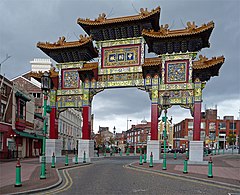Chinatown, Liverpool
| Liverpool Chinatown | |
|---|---|
 Chinatown Gate, Nelson Street |
|
| Metropolitan borough | |
| Metropolitan county | |
| Region | |
| Country | England |
| Sovereign state | United Kingdom |
| Post town | LIVERPOOL |
| Postcode district | L1 |
| Dialling code | 0151 |
| Police | Merseyside |
| Fire | Merseyside |
| Ambulance | North West |
| EU Parliament | North West England |
| UK Parliament | |
| Liverpool Chinatown | |||||||||||||
| Traditional Chinese | 利物浦中國城 | ||||||||||||
|---|---|---|---|---|---|---|---|---|---|---|---|---|---|
| Simplified Chinese | 利物浦中国城 | ||||||||||||
|
|||||||||||||
| Alternative Chinese name | |||||||||||||
| Chinese | 利物浦唐人街 | ||||||||||||
|
|||||||||||||
| Transcriptions | |
|---|---|
| Standard Mandarin | |
| Hanyu Pinyin | Lìwùpǔ Zhōngguóchéng |
| Yue: Cantonese | |
| Yale Romanization | leih maht póu jūng gwok sìhng |
| Jyutping | lei6 mat6 pou2 zung1 gwok3 sing4 |
| Transcriptions | |
|---|---|
| Standard Mandarin | |
| Hanyu Pinyin | Lìwùpǔ Tángrénjiē |
| Yue: Cantonese | |
| Yale Romanization | leih maht póu tòhng yàhn gāai |
| Jyutping | lei6 mat6 pou2 tong4 jan4 gaai1 |
Chinatown is an area of Liverpool that is an ethnic enclave home to the oldest Chinese community in Europe. Located in the south of the city centre, Chinatown has many Chinese businesses, such as Chinese restaurants and supermarkets, and facilities for the Chinese community. The area is also notable for its Chinese-style architecture; with the paifang on Nelson Street being the largest, multiple-span arch of its kind outside of China.
The first presence of Chinese people in Liverpool dates back to 1834 when the first vessel direct from China arrived in Liverpool's docks to trade such goods as silk and cotton wool. Many Chinese immigrants first arrived in Liverpool in the late 1860s as a result of Alfred Holt and Company employing large numbers of Chinese seamen while establishing the Blue Funnel Shipping Line. The commercial shipping line created strong trade links between the cities of Shanghai, Hong Kong and Liverpool; mainly importing silk, cotton and tea. From the 1890s onwards, small numbers of Chinese began to set up businesses catering to the Chinese sailors working on Holt's lines and others. Some of these men married working class British women, resulting in a number of British-born Eurasian Chinese being born in Liverpool.
At the beginning of World War II, there were up to 20,000 Chinese mariners in the city. In 1942, there was a strike for rights and pay equal to that of white mariners. The strike had lasted for four months. For the duration of the War these men were labelled as "troublemakers" by the shipowners and the British Government. At the end of the conflict, they were forbidden shore jobs, their pay was cut by two-thirds and they were offered only one-way voyages back to China. Hundreds of men were forced to leave their families, with many of their Eurasian children continuing to live in and around Liverpool's Chinatown to this day.
...
Wikipedia
